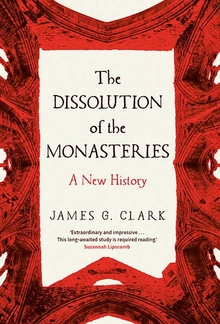The Dissolution of the Monasteries
WARNING
You are viewing an older version of the Yalebooks website. Please visit out new website with more updated information and a better user experience: https://www.yalebooks.com
A New History
James Clark
The first account of the dissolution of the monasteries for fifty years—exploring its profound impact on the people of Tudor England
“This is a book about people, though, not ideas, and as a detailed account of an extraordinary human drama with a cast of thousands, it is an exceptional piece of historical writing.”—Lucy Wooding, Times Literary Supplement
Shortly before Easter, 1540 saw the end of almost a millennium of monastic life in England. Until then religious houses had acted as a focus for education, literary, and artistic expression and even the creation of regional and national identity. Their closure, carried out in just four years between 1536 and 1540, caused a dislocation of people and a disruption of life not seen in England since the Norman Conquest.
Drawing on the records of national and regional archives as well as archaeological remains, James Clark explores the little-known lives of the last men and women who lived in England’s monasteries before the Reformation. Clark challenges received wisdom, showing that buildings were not immediately demolished and Henry VIII’s subjects were so attached to the religious houses that they kept fixtures and fittings as souvenirs. This rich, vivid history brings back into focus the prominent place of abbeys, priories, and friaries in the lives of the English people.
"Exceptional … The author's extensive research has unearthed a wealth of previously overlooked details that challenge centuries of controversy, rumour and misconception. As well as providing a fresh perspective on well known characters such as Henry VIII and his 'henchman' Thomas Cromwell, the narrative brings the people who lived and worked in the monasteries vividly to life. A stunning achievement."—Tracy Borman, author of Thomas Cromwell
Publication Date: November 2, 2021
32 color illus.


